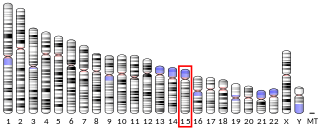Integrin alpha-6 is a protein that in humans is encoded by the ITGA6 gene.
Integrin alpha-6 is a protein that in humans is encoded by the ITGA6 gene.
The ITGA6 protein product is the integrin alpha chain alpha 6. Integrins are integral cell-surface proteins composed of an alpha chain and a beta chain. A given chain may combine with multiple partners resulting in different integrins. For example, alpha 6 may combine with beta 4 in the integrin referred to as TSP180, or with beta 1 in the integrin VLA-6. Integrins are known to participate in cell adhesion as well as cell-surface mediated signalling. Two transcript variants encoding different isoforms have been found for this gene. [5] Specific loss of this integrin chain in the intestinal epithelium, and thus of their hemidesmosomes, induces long-standing colitis and infiltrating adenocarcinomas. [6]
ITGA6 has been shown to interact with TSPAN4 [7] and GIPC1. [8]

Integrin beta-1 (ITGB1), also known as CD29, is a cell surface receptor that in humans is encoded by the ITGB1 gene. This integrin associates with integrin alpha 1 and integrin alpha 2 to form integrin complexes which function as collagen receptors. It also forms dimers with integrin alpha 3 to form integrin receptors for netrin 1 and reelin. These and other integrin beta 1 complexes have been historically known as very late activation (VLA) antigens.

CD49d is an integrin alpha subunit. It makes up half of the α4β1 lymphocyte homing receptor.

Integrin alpha-2, or CD49b, is a protein which in humans is encoded by the CD49b gene.

Integrin alpha-3 is a protein that in humans is encoded by the ITGA3 gene. ITGA3 is an integrin alpha subunit. Together with beta-1 subunit, it makes up half of the α3β1 integrin duplex that plays a role in neural migration and corticogenesis, acted upon by such factors as netrin-1 and reelin.

Integrin beta-3 (β3) or CD61 is a protein that in humans is encoded by the ITGB3 gene. CD61 is a cluster of differentiation found on thrombocytes.

CD63 antigen is a protein that, in humans, is encoded by the CD63 gene. CD63 is mainly associated with membranes of intracellular vesicles, although cell surface expression may be induced.

Caveolin-1 is a protein that in humans is encoded by the CAV1 gene.

Integrin alpha-IIb is a protein that in humans is encoded by the ITGA2B gene. ITGA2B, also known as CD41, encodes integrin alpha chain 2b. Integrins are heterodimeric integral membrane proteins composed of an alpha chain and a beta chain. Alpha chain 2b undergoes post-translational cleavage to yield disulfide-linked light and heavy chains that join with beta 3 to form a fibrinogen receptor expressed in platelets that plays a crucial role in coagulation. Mutations that interfere with this role result in thrombasthenia. At least 38 disease-causing mutations in this gene have been discovered. In addition to adhesion, integrins are known to participate in cell-surface mediated signalling.

Integrin alpha-5 is a protein that in humans is encoded by the ITGA5 gene.

CD81 molecule, also known as CD81, is a protein which in humans is encoded by the CD81 gene. It is also known as 26 kDa cell surface protein, TAPA-1, and Tetraspanin-28 (Tspan-28).

Integrin, beta 4 (ITGB4) also known as CD104, is a human gene.

Alpha-actinin-4 is a protein that in humans is encoded by the ACTN4 gene.

Eukaryotic translation initiation factor 6 (EIF6), also known as Integrin beta 4 binding protein (ITGB4BP), is a human gene.

Integrin alpha-9 is a protein that in humans is encoded by the ITGA9 gene. Cytogenetic location: 3p22.2

Tetraspanin-4 is a protein that in humans is encoded by the TSPAN4 gene.

Disintegrin and metalloproteinase domain-containing protein 2 or Beta-fertilin is an enzyme that in humans is encoded by the ADAM2 gene.

Integrin alpha-D is a protein that in humans is encoded by the ITGAD gene.

Integrin alpha-11 is a protein that, in humans, is encoded by the ITGA11 gene.

Collagen alpha-1(XXVI) chain is a protein that in humans is encoded by the EMID2 gene.

Integrin alpha-10 also known as ITGA10 is a protein that in humans is encoded by the ITGA10 gene.